Security Forces Threaten Teachers Protesting Against Poisonings
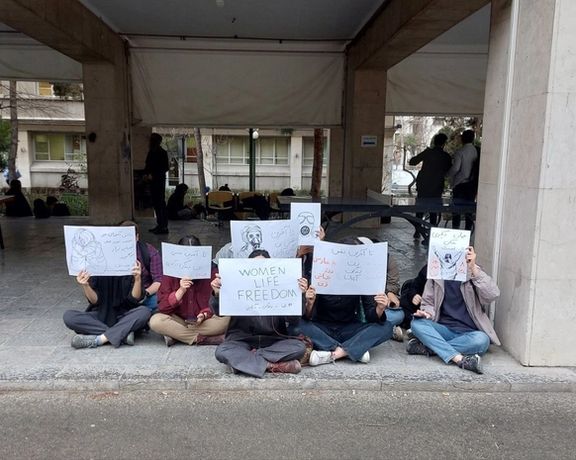
As chemical attacks continue across schools in Iran, threatening text messages from Iran's security agencies have been sent to teachers warning them from supporting protests.

As chemical attacks continue across schools in Iran, threatening text messages from Iran's security agencies have been sent to teachers warning them from supporting protests.
Teachers and activists who organized gatherings and protests to express concern over the health of students, were also summoned by the judicial authorities.
During Tuesday's nationwide protests against the serial poisonings, the law enforcement forces violently attacked teachers and parents in different cities by firing tear gas while several were arrested.
At least 297 poisonings have been reported in girls' schools in 25 Iranian provinces since November 30when the first attack occurred in the religious city of Qom, believed to be led by regime agents in a bid to quash students' support of the 'woman, life, freedom' movement.
The chemical attacks were not limited to schools, and in the past days, female students at university dormitories have also been targeted. Nearly two thousand students have been taken to hospitals and medical centers so far.
Meanwhile, summonses and sentences for civil, political and student activists continue. In a recent case, a revolutionary court sentenced children’s rights activist Samaneh Asghari to 18 years and three months in prison, of which six years and three months can be enforced.
Samaneh Asghari, an industrial engineering student at Kharazmi University, was arrested on October 19 during a protest in Tehran.
Leila Hosseinzadeh, a political activist, and student has also tweeted that she has been summoned by the ministry of intelligence.

While the world celebrated the International Women's Day, with Iran in focus, the US bestowed the Madeleine Albright award on Iranian women.
In a ceremony hosted by First Lady Jill Biden and Secretary of State Antony Blinken at the White House on Wednesday, US Ambassador to UN Linda Thomas-Greenfield presented the inaugural Madeleine Albright Honorary Group International Women of Courage Award to the women and girls in Iran, who embarked on months of grassroots rallies following the death of Mahsa Amini, the 22-year-old Iranian woman died in ‘hijab police’ custody.
The United States also honored 11 global women leaders -- some from countries hit by crises -- to mark International Women's Day and recognize those with "exceptional courage, strength, and leadership in advocating for peace, justice, human rights, gender equity and equality, often at great personal risk and sacrifice."
Earlier in the day, US State Department Spokesperson Ned Price announced the new annual award in honor of Former Secretary of State Madeleine Albright’s legacy and her championing of women’s rights and universal rights around. “Given her longstanding support for women’s empowerment and leadership, we can’t think of someone who exemplifies the goals and values of the IWOC Award better than Former Secretary Albright,” he said, adding, “We’re proud to recognize the women and girl protestors of Iran with the inaugural Madeleine Albright Group Honorary Award this year.”
Price said that over the course of the past six months, the world has witnessed the bravery, the determination, the resilience of the protesters in Iran, so many of whom are women, noting that the leadership of this movement is in some ways dominated by women as they are at the vanguard of this movement.
“We have seen the remarkable courage of these protesters, including these women who have taken to the streets at no shortage of personal risk to themselves," he added, highlighting that “They are in prison; they’ve been harassed; they’ve been injured. In too many cases, the regime has ended their lives prematurely for doing nothing more than exercising a right that is as universal to them as it is to women and girls here in this country.”
In a statement to mark the occasion, US President Joe Biden said, “ We see it in Afghanistan, where the Taliban bars women and girls from attending school and pursuing employment. We see it in Iran, where the regime is brutally repressing the voices of women who are courageously standing up for their freedom.”
This year’s International Women's Day saw activists holding demonstrations all over the world from Jakarta and Singapore to Istanbul, Berlin, Paris, Rome, Caracas, Montevideo, and so many others with a focus on Iran, embroiled in antigovernment protests, and Afghanistan, where girls are denied the right to education.
In London, protesters marched to the Iranian embassy in costumes inspired by the novel and television series "The Handmaid's Tale", while in Valencia, Spain, women cut their hair in support of the Iranian women.
In recent days, the Islamic Republic has faced renewed global pressure amid public anger over a wave of chemical attacks on girls in dozens of schools. The regime has arrested several people it accuses of connections to the poisonings as well as to "foreign-based dissident media".
Also on Wednesday, Farhan Haq, the deputy spokesperson for the United Nations secretary-general, said the UN is following the reports about poisoning among schoolchildren and the UN Country Team has offered support to speedily and accurately ascertain the facts of this issue. "It's important for the Iranian authorities to investigate this fully and transparently, but we'll continue to monitor what's going on there,” he said.
In a tweet on Wednesday, UNESCO urged thorough investigations and immediate actions to protect schools and facilitate the return of affected students in Iran to their safe and healthy classrooms. UNESCO Director-General Audrey Azoulay expressed deep concern “about the reported poisoning of schoolgirls in Iran over the past three months,” describing the attacks as “a violation of their right to safe education.”
The UK and the US, the European Union, and Australia issued sanctions on the Islamic Republic to mark International Women's Day. The UK targeted global violators of women’s human rights, including Iran's morality enforcing outfit and its top official, while the US imposed sanctions on Iranian officials and companies over serious human rights abuses.
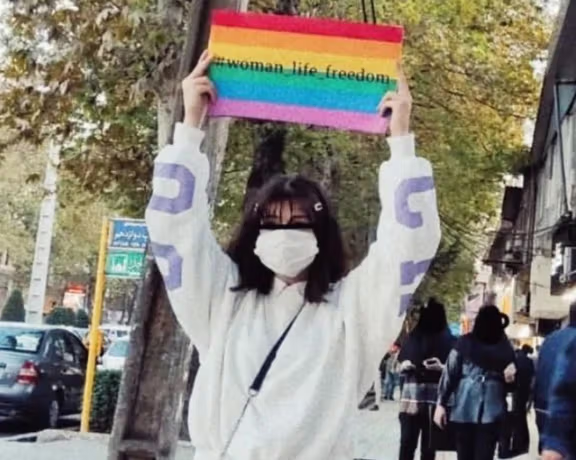
The Iranian Queer Liberation Front has vowed to continue the fight against sexual and gender apartheid in Iran.
“Feminist struggles must continue against all forms of core patriarchy upon which the regime is founded,” it announced on International Women’s Day.
The statement called the ‘Woman, Life, Freedom’ movement a turning point in the struggles of the LGBTQ community of Iran in the fight against sexual and gender apartheid and patriarchal structures.
“This year's International Women’s Day is an opportune moment to voice our common struggle louder and more expressively and renew our commitment to our joint struggle. It is a struggle that is symbolically and actually inclusive of all women,” it added.
Since the beginning of the uprising in September, Iranian LGBTQ activists have expressed their demands after the fall of the Islamic Republic by participating in popular struggles inside and outside the country.
Prominent opposition figures, including Prince Reza Pahlavi and Masih Alinejad, have repeatedly emphasized the need to support the rights and freedoms of the queer community in Iran should the Islamic Republic collapse.
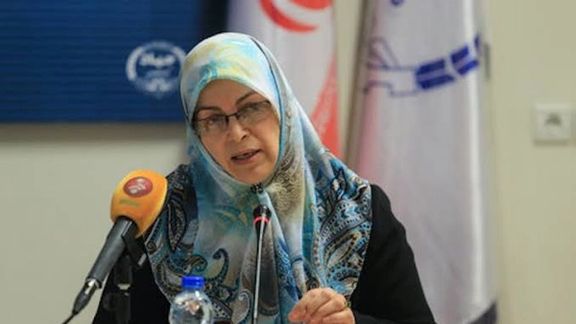
An Iranian reformist party has demanded an end to compulsory hijab and laws that legalize child marriage and discrimination against women in education and work.
In a statement to mark International Women’s Day, the Etehad-e Mellat party strongly criticized the many discriminatory laws of the Islamic Republic against women including the compulsory veiling laws and called for their abolition or change.
Etehad-e Mellat, formed in 2015, is the only major Iranian political party with a female secretary general, Azar Mansouri, who was elected by the party’s congress in December 2021. Many of the party’s members are veteran reformist politicians and activists and members of the Islamic Iranian Participation Front (Mosharekat) which was banned in 2009.
In the past few years the anti-compulsory hijab movement which took root with a social media campaign in 2017 called White Wednesdays, has hugely grown. The movement has gained greater momentum since the death in custody of the 22-year-old Mahsa Amini in September and the protests that her death sparked.
Many women now are adamant to be hijab free in public. They can be seen defiantly rejecting the head scarf everywhere, from restaurants to banks and in parks where previously, they could not even enter without a head covering.
To re-establish its control over women, authorities have resorted to threats against women again. After the video of a female pharmacist’s argument with a customer who demanded that she should wear the hijab went viral recently, authorities ordered all female pharmacists and pharmacy workers to wear maqna’e, a black veil with stitched front coming down to the chest that is much more conservative than the headscarf, and threatened to shut down the pharmacies if their staff did not comply.
Family laws give men the right to make decisions about women’s lives and Etehad-e Mellat wants to see this change. In a statement, it says that state-sponsored cultural entities and media help promote fundamentalist views and provoke the religiously-minded to restrict women’s rights and freedoms.
The party has also criticized discrimination against women in higher education as women are barred from studying certain subjects or given limited acceptance opportunities to allow more men to enrol. There is also discrimination against women when it comes to holding teaching positions in universities and higher government positions.
Etehad-e Mellat also criticized the authorities for trying to cast women in the role of housewives and men as breadwinners and giving the men the right to stop their wives from working after marriage while also encouraging marriage of girls as young as thirteen.
Iran's state media often air the views of fundamentalist clerics and others who tell women and girls that it is their religious duty to obey and serve their husbands, to marry young and to raise many children.
Many in Iran are critical of the population policy espoused by the regime to boost the country’s population growth as Supreme Leader Ali Khamenei has always demanded. Khamenei has repeatedly said that Iran’s population should increase from 80 million to 150 million.
In a statement released on Sunday, some women’s rights activist groups vowed to continue their struggle against the regime until the victory of the Woman, Life, Freedom movement. In their statement, they enumerated the various discriminations against women in the Islamic Republic including the right to travel abroad without their male family members or husbands’ permission, discriminatory inheritance laws in favor of male inheritors, restrictions on women’s right to seek divorce and to have custody of their children.
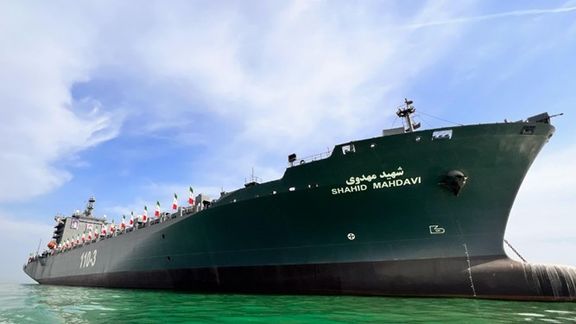
Iran’s Revolutionary Guard Corps navy announced it has added a new ocean-going warship and tens of missile-launching speed boats to its fleet.
The vessels were part of a major upgrade, bolstering the country's navy fleet in the midst of the worst recession in recent history.
The IRGC held an unveiling ceremony in the port city of Bandar Abbas on Thursday but did not declare how much the project had cost.
The Iranian-made Shahid Mahdavi warship, converted from a commercial vessel, will take center stage in the fleet’s renewal, along with 99 Ashura and Tariq speed boats, which have been upgraded from rocket-launching vessels to missile-launching ones.
The bolstering of the fleet comes amidst growing tensions between Iran and its arch enemy Israel. Iran has been claiming to have deployed more weapons and radars following threats from Israel which says that military force has not been ruled out, while Iran continues expanding its nuclear weaponry.
“The Mahdavi ocean-going vessel is ready to carry out missions with all the necessary equipment and facilities to create stable security in the seas,” said IRGC Navy commander Alireza Tangsiri.
According to Tangsiri, the 2100 ton Shahid Mahdavi, which measures 240 meters in length and 27 meters wide, is equipped with a 3D phased array radar, surface-to-surface and surface-to-air missiles, and highly advanced telecommunication systems.
It is capable of carrying helicopters, UAVs, missile launchers, as well as missile defense and radar systems.
He added that the range of missiles on the speed boats is between 10 and 180 kilometers, and according to him, this is the first time that such vessels have been designed with this feature.
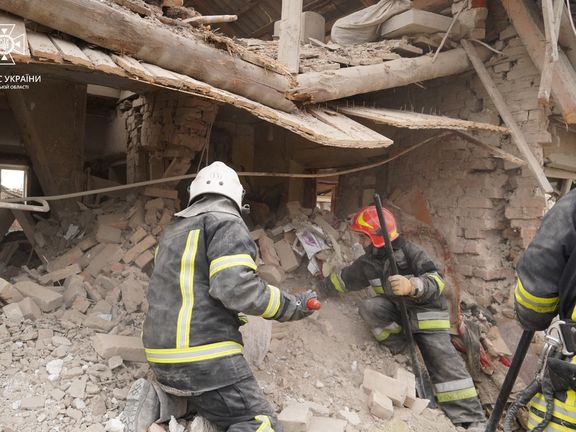
Russia unleashed a large-scale missile and drone attack on Ukraine Thursday morning targeting energy infrastructure and killing at least six people.
According to the Ukrainian military, Russia used 81 missiles and eight Iranian-made Shahed kamikaze drones in the attack.
The attacks were mainly on energy facilities and hit more than half a dozen regions, striking the capital Kyiv, the Black Sea port of Odesa and the second-largest city Kharkiv.
Ukraine's military said air defenses knocked out at least 34 missiles and four Shahed suicide drones, but regional officials said five people were killed in the western region of Lviv and one in southeastern Dnipropetrovsk in southeastern Ukraine.
"This was a major attack and for the first time with so many different types of missiles...The enemy launched six Kinzhals," air force spokesperson Yuriy Ihnat said. "It was like never before."
Iran has supplied hundreds of Shahed and other drones to Russia since mid-2022, and although Ukraine is capable of shooting down most of the slow-moving UAVs, Russia relies on the Iranian weapon to swarm Ukraine’s air defenses.
The United States and its European allies have imposed a series of sanctions on Iranian individuals and companies involved with the drone program and shipments of the weapon to Russia. They have also warned Tehran that one of the conditions to restart nuclear talks is ending its weapons supplies to Russia. A nuclear agreement between Iran and West could suspend most economic sanctions and boost the country’s economy.